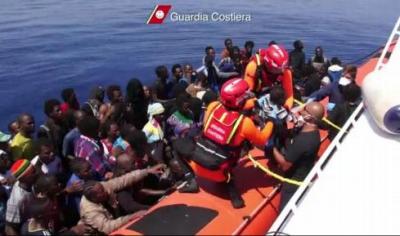Lampedusa tragedy calls attention to Italy's migration dilemma
ANDREW GARGANO
|
3 October 2013

Italian Coast Guard rescues African migrants after their boat capsized near Lampedusa
ROME - Thursday's disaster in Lampedusa has brought further attention to Italy's problem in managing its immigration crisis.
With conflict escalating in the Middle East and Africa, Italy has become a major port of entry for migrants seeking asylum in Europe. Shortly before a boat carrying African asylum-seekers capsized off the coast of Lampedusa, another boat of 463 Syrian immigrants entered the Sicilian island's harbor. So far in 2013, over 22,000 migrants have arrived by boat seeking refuge in Italy, the United Nations High Commissioner for Refugees reports.
However, not all migrations to Italy are successful, with Thursday's Lampedusa disaster being just part of an ongoing string of events. Just on Monday, 13 Eritrean migrants drowned while swimming to shore near the Sicilian city of Ragusa. Since 1994, roughly 6,200 migrants have been killed in the Strait of Sicily. Meanwhile the Italian Coast Guard has rescued more than 30,000 refugees around the island of Lampedusa in recent years, the agency reports.
The conditions experienced by asylum-seekers arriving in Italy have reached harmful levels, as smugglers cram migrants into overcrowded boats, creating hazardous situations for passengers. Furthermore, once refugees survive the unpleasant voyages, they must face the Italian asylum process: the majority are sent to migration camps, which Amnesty International reports as lacking "adequate sanitation," while many others are sent directly back to their home countries.
Back in July, in a visit to Lampedusa, Pope Francis called the island's refugee crisis a "global indifference" while he highlighted the problems migrants face when seeking asylum in Italy. More recently, the Council of Europe has criticised Italy's treatment of migrants as "wrong and counterproductive," explaining that when Italy sends migrants back to war-torn countries, they may risk torture or even their lives. The Council's judgment has prompted responses from several Italian officials.
Italian Integration Minister, Cecile Kyenge, called for Europe to take action on the problem, stating that "we cannot underestimate this situation." She explained that "we are witnessing a human tragedy" that affects not only Italy, but "all the countries of Europe." Italian Transport Minister, Maurizio Lupi, released a similar statement, calling for Italy to "intensify rescue efforts" in order to "stop the merchants of death who exploit the hopes of the poor."
Italian President Giorgio Napolitano also responded to the situation, staying that "these tragedies oblige us to find a way to avoid them." Yet the Italian Minister of Foreign Affairs, Emma Bonino, who remains a bit doubtful on the situation, explained that "there is not a miracle solution."
Thursday's tragedy also called attention from non-politcal public figures. The Community of Sant'Egidio, who just hosted the International Meeting for Peace in Rome, released a statement from its founder, Andrea Riccardi, demanding a response to the migration crisis in Italy. Professor Riccardi stated that "we need to organise an international control system on the coasts of the Mediterranean" in order to help control human trafficking and provide relief to those fleeing war zones.


